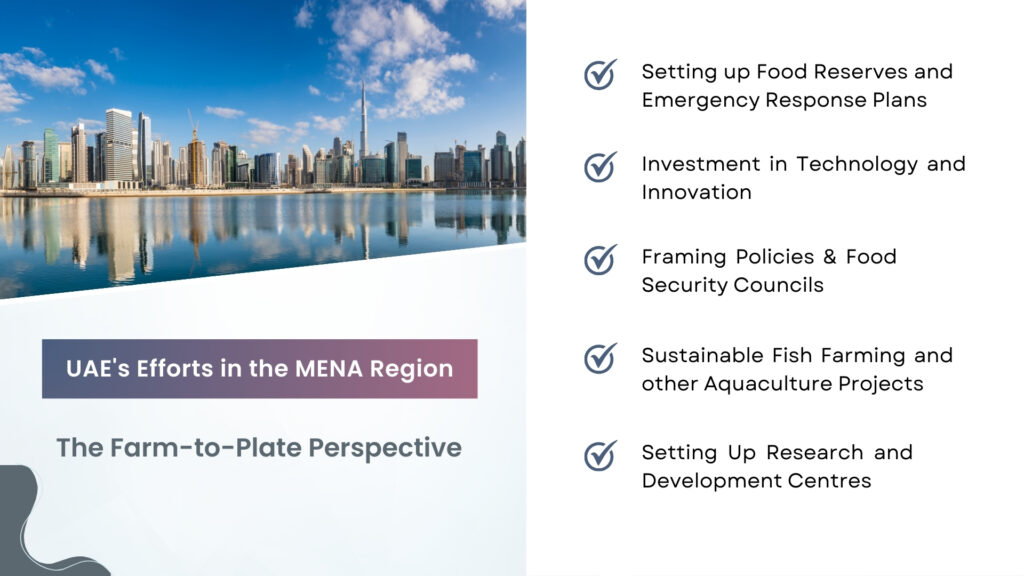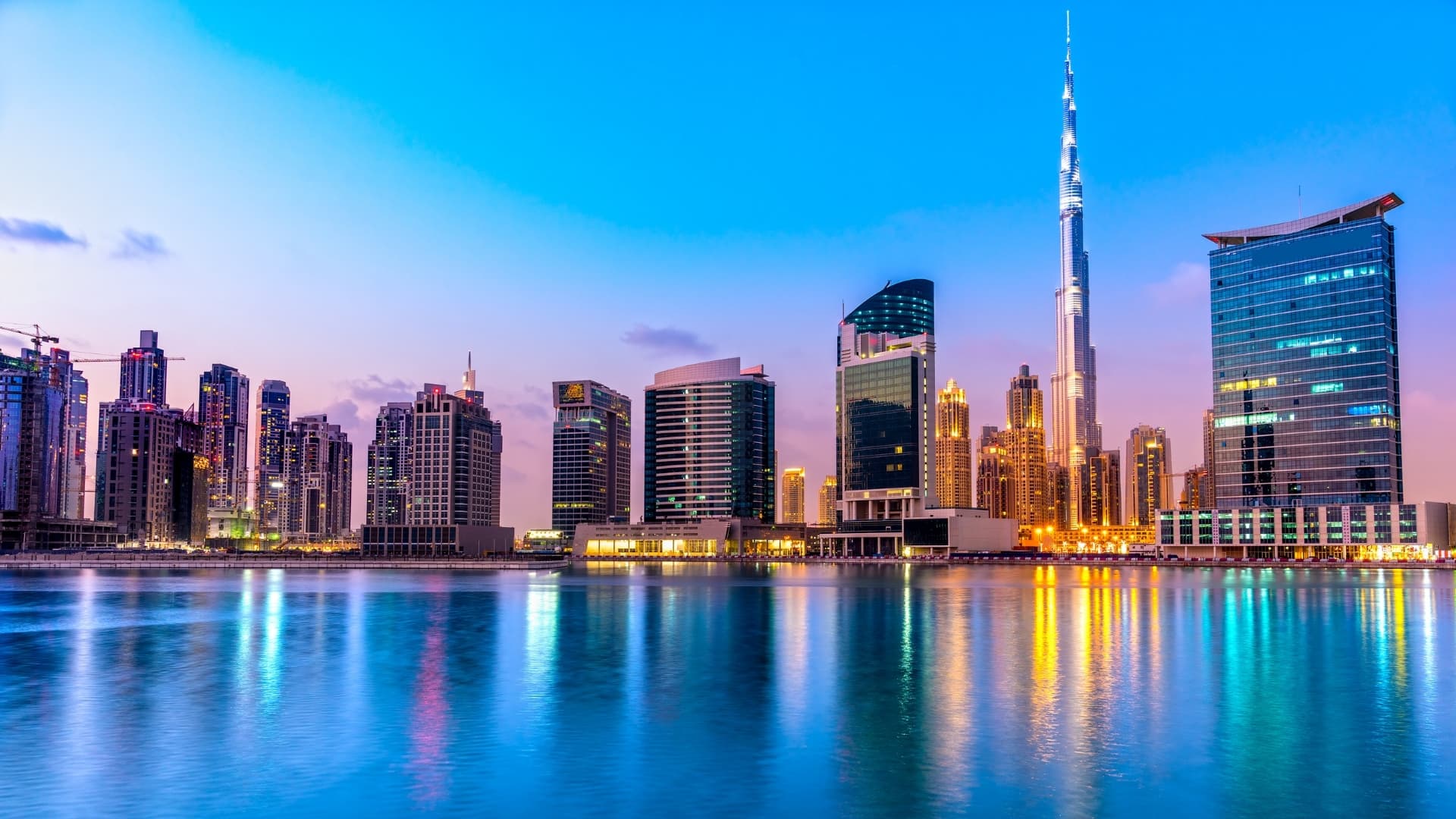The MENA region has a large percentage of the population living in rural areas depending solely on agriculture. However, meeting the bare minimum needs might get challenging due to its challenging environment and atmospheric conditions. The positive side of the situation is that the UAE has always been at the forefront of fostering robust agricultural ties with countries across this region. Constant strategic initiatives are being taken to ensure food security, boost agricultural productivity, and introduce sustainable farming practices. The idea is to address the challenges and make efforts to make the lives of people easier.
UAE is working closely with the regional partners to identify the challenges that climate change, water scarcity, and inefficient resource management bring. Moreover, efforts are being made to leverage advanced technologies and innovative solutions to bring the necessary change. All these efforts are contributing towards enhancing the food supply and strengthening the economic development of the MENA countries.
Bilateral Agreements and Memoranda of Understanding (MoUs)
The UAE has made significant strides in bolstering its agricultural and food sector relationships with countries in the Middle East and North Africa (MENA) region. The country has actively introduced and implemented bilateral agreements and MoUs to strengthen agricultural ties. These collaborations have paved the way for technology transfer and boosting promising farming practices.
The UAE has initiated several projects that aim to reclaim desert land for agricultural use and develop drought-resistant crop varieties. These initiatives are crucial for creating a more resilient agricultural sector capable of withstanding the harsh environmental conditions typical of the MENA region. The bilateral agricultural activities by the UAE extend to improving food supply chains. They are working to streamline logistics, reduce food waste, and improve overall distribution efficiency by collaborating with neighboring countries at different levels.
1. Investment in Agricultural Projects
One of the crucial aspects of the UAE’s strategy is the investment in agricultural projects. The UAE is leveraging its financial resources at a large scale to support agricultural development projects in the MENA region. They have started various funding activities, including grants and loans, providing the necessary capital for infrastructure development, research, and capacity building.
2. Promising Trade Agreements
The UAE has signed import agreements with MENA countries for various agricultural products, like fresh produce and grains. This way, it ensures a reliable and diverse food supply for its population. Additionally, it helps the MENA countries build a stronger economy.
3. Collaborative Research
Collaborative research programs are at the backbone of the UAE’s agricultural strategy. The UAE government has partnered with institutions from other MENA countries, focusing on better crop yields. The researches they carry out promote the development of drought-resistant crops and make use of advanced irrigation technologies.
4. Ensuring Food Security
Another effort by the UAE is to ensure regional food security by establishing strategic food reserves, and fruitful food corridors. By focusing on these initiatives, the UAE can ensure a stable and sustainable food supply, even if there is an emergency or crisis.
UAE’s Efforts in the MENA Region: The Farm-to-Plate Perspective

Farm to Plate has been actively coming up with ways and strategies that one can use to revolutionize the food industry with the use of the right technology. The UAE has been making use of multiple research and agricultural solutions supported by us to ensure food security, and enhance transparency and traceability. In recent years, the UAE has continued to strengthen its agricultural ties with MENA countries through various initiatives. Some of the recent developments are listed below.
1. Setting up Food Reserves and Emergency Response Plans
Farm to Plate has multiple initiatives to make the idea of setting up food reserves a reality. The UAE has followed these initiatives and worked hard to establish strategic food reserves, ensuring uninterrupted supply of essential food items. These food reserves help a lot at the time of crisis, avoiding supply chain disruptions. The recent development is UAE’s National Food Security Strategy 2051 which includes provisions for maintaining and managing these reserves.
2. Investment in Technology and Innovation
In 2023, the UAE signed several MoUs with Egypt to enhance cooperation in agricultural technology and innovation. There was significant investment involved to maximize food production and minimize food waste. For example, The UAE pioneered the use of hydroponics and vertical farming to ensure optimum use of the limited spaces. Furthermore, collaborative research and technical initiatives were introduced to divert the focus on the production of drought-resistant crops.
3. Framing Policies & Food Security Councils
Another notable effort is the establishment of food security councils and policies by the UAE to coordinate efforts at different levels. Different frameworks and teams make an effort to harmonize food security policies among MENA countries. Additionally, these bodies continuously monitor food security indicators and frame quick response mechanisms for any potential emergency situations. For example, in 2022, the UAE invested in large-scale agricultural projects in Sudan, focusing on crop production and livestock farming.
4. Sustainable Fish Farming and other Aquaculture Projects
This initiative by the UAE reduces the dependency on imported seafood by starting various sustainable aquaculture collaborations. The fishery projects often focus on implementing useful and fruitful fish farming initiatives that focus on high productivity and sustainability. Additionally, the UAE has partnered with Oman and Egypt to build large-scale aquaculture projects that ensure seafood security at the regional level.
5. Setting Up Research and Development Centres
To promote agricultural innovation and make use of available technology, the UAE has established various research and development centres. The UAE has established regional research and development centres to promote agricultural innovation and knowledge sharing. For example, in 2022, the UAE and Jordan have developed a partnership to focus on water management and the development of sustainable agricultural practices. Furthermore, research and development efforts are being made to ensure high-yield and develop resilient crops as per the climatic conditions of a particular region.
All these efforts and collaborations highlight the UAE’s commitment towards fostering regional cooperation, innovation, and sustainability in the agricultural sector.
Conclusion
The UAE government has been actively making efforts to engage in bilateral agricultural and food activities with MENA countries. All the efforts and initiatives focus on exemplifying the strategic approach to boost food security and sustainable agricultural practices. Constant efforts are being made, whether it is setting up the food corridors, collaborating in research programs, or making significant financial investments. Through these efforts, the UAE ensures an uninterrupted food supply for its people. At the same time, it has made a huge contribution towards the agricultural development of this region.
Tanya A Mishra, Technical Content Writer & Marketer at farmtoplate.io (specialising in MENA Tech Landscape). She has been working towards crafting insightful content on topics like Blockchain, Agritech, AI and many more.
